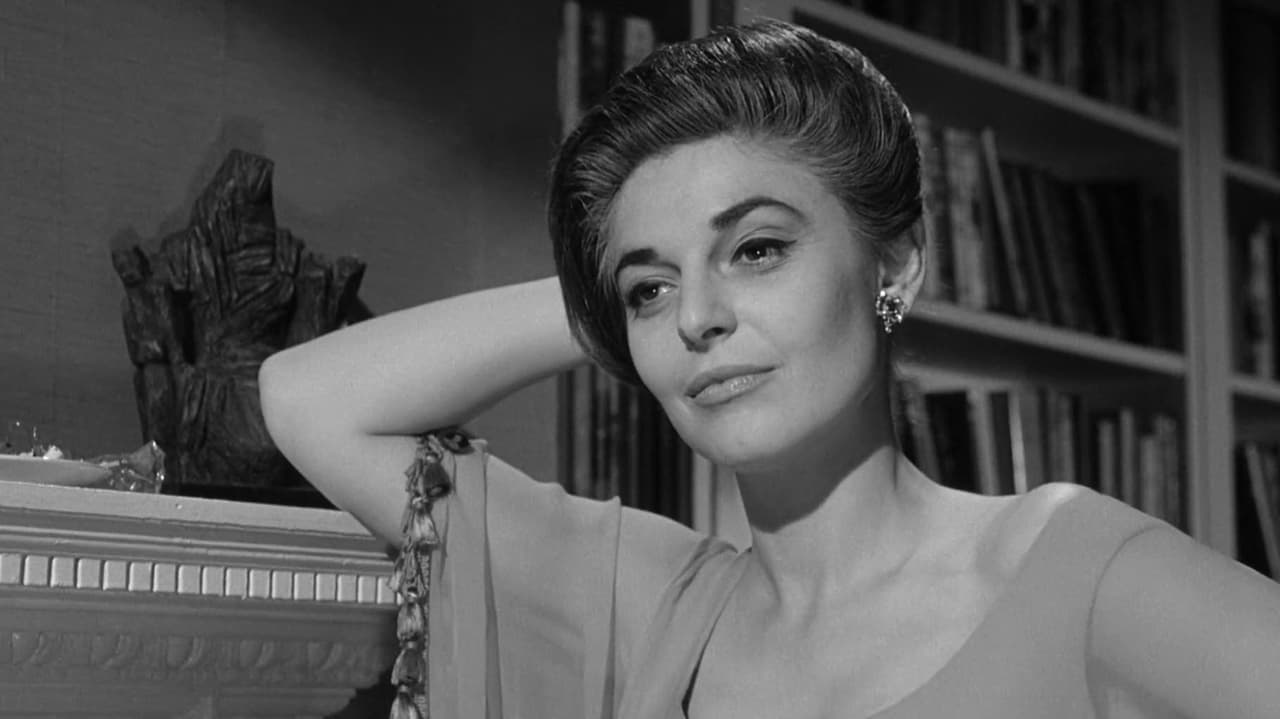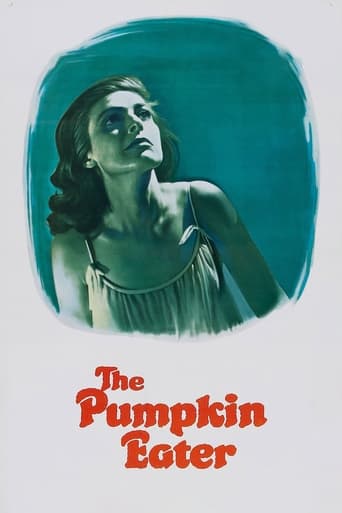

Why so much hype?
... View MoreToo many fans seem to be blown away
... View MoreBlistering performances.
... View MoreThe film may be flawed, but its message is not.
... View MoreI owe this movie a disclaimer before giving it a scathing review: I turned it off. I didn't see The Pumpkin Eater all the way through, so I have no idea if the second half or the end redeems the terrible beginning. Anne Bancroft was nominated for Best Actress at the Oscars for her role as a depressed, repressed housewife in this dark, slow, drama. She's married to Peter Finch, and while he continually cheats on her, she's in therapy to try and figure out why she's so unhappy. By the time I turned it off, she'd started discussing her aversion to sex and her unfulfillment in her marriage. I only saw one expression on Anne's face, as if she'd just gotten a shot of Botox in her forehead, and since I'd expected more from this critically-acclaimed performance, I turned it off. Despite the supporting cast of James Mason, Maggie Smith, Cedric Hardwicke, and Janine Gray, I wasn't even remotely tempted to keep watching. As a side note, I also turned off The Happy Ending, a film starring Jean Simmons who tries to figure out why she's chronically unhappy in her marriage. These types of movies are not my favorite. If you like them, feel free to disregard my opinion.
... View MoreAfter the broodingly sterling mental-horror work THE INNOCENTS (1961), director Jack Clayton, whose prestige is quite underrated, switches to a slow-paced, in-door drama, which delineates the turbulent experience of a 3rd-time married woman trapped in a multi-children marriage (8 to be specific). The film has a more manifest achievement is to testify what an electrifying actress Ms. Bancroft was. Due to the less popularity of the film and the recent "past-year-winner" laurel (for THE MIRACLE WORKER 1962), sadly but true she didn't win an Oscar for her tour-de-force performance (lost to Julie Andrews in MARY POPPINS). In the film she dominates every frame with an unbending willpower to embody her character through every line and every perceivable movement, a perfect-pitched textbook triumph. Peter Finch, a commonplace womanizer under the disguise of a commonplace congenial father and screenplay writer, although inevitably eclipsed by his wife in the film, also manages a spot- on job. Dame Maggie Smith, whose unexpected advert is an interesting cameo, such a delightedly spiteful case (I haven't seen her role in her youth before). Also Yootha Joyce's OTT jealous woman in the hair salon, gives a spine-chilling terror, by comparison, James Mason, a third-billed name, actually has a pretty limited presence.The chief glitch of the film is that in several instances the cast is tediously repeating the same lines as if it is not annoying enough for just one stroke (screenplay written by Harold Pinter, adapted from Penelope Mortimer's novel), which is a bit unbearable. The ending of a reconciled harmony between the aliened couple, which seemed like a compromised concession on the spot, but an afterthought assessment would probably reckon it as a great mockery to the modern monogamy marriage system. ps: The film does make the endorsement of emphasizing the importance of condoms, the most essential invention from 20th century, without peers.
... View MoreWhile Anne Bancroft is very believable in this somewhat dark and angst- ridden drama, its a bit hard to relate.The story basically encompasses unhappy marriage, a cheating husband, the balm of family and children, and how all this affects a beautiful but bored London housewife.The James Mason character is very good, as a meddlesome and disturbed friend, also unhappily married to a faithless wife (well-portrayed, the role of Philpot, Maggie Smith).When he takes Bancroft on a trip with the children to the local zoo, his self-hatred and rage is projected onto Bancroft as she is informed that her husband (a deranged and manic Peter Finch) has impregnated Philpot, wants to have the child, and convinced Bancroft to abort her child. The betrayal, pettiness, heartbreak and demise of marriage is well depicted.That being said, while the performances are excellent this is a rather depressing film for anyone who may have been through this (in a less melodramatic form of course). Overall, it may be due for a milder remake, which does not place its characters on the verge of suicide to make its point. I enjoyed Bancroft but the story itself, and the fact that she is a character who simply keeps procreating to feel a purpose, is too abysmal and sad to make the premise believable.
... View MoreA husband's unfaithfulness triggers his wife's depression. Jo (Anne Bancroft), already a parent of five children, marries Jake Armitage (Peter Finch) and is devastated when he has sex with her best friend. Since this is an early sixties pre-feminist film, it doesn't occur to any of the characters that at least part of Jo's problems may stem from the fact she isn't allowed any real role in life except that of being a wife and mother. As was so common with marriages at the time, she's way too over-involved in her husband and her self-esteem rises and falls according to his moods. Jo's in a double bind. If she were to look for a role outside of the home, she would be accused of being unable to accept her feminine role. Even though Jo's sent to see a psychiatrist, Jake has his own problems. Why in the world would he marry a woman obsessed with child-bearing and then complain about his lack of privacy and the fact that she wants to get pregnant again? Her pregnancies may be a way of self-medicating her depression. Jo is completely invested in her role as a mother, but her depression makes her unable to truly love and care for her children. Her oldest daughter becomes her surrogate parent and has the sad job of being perpetually cheerful and competent as she tries to cheer up Jo. Despite being a lousy husband, Jake is good dad. He co-opts her in her relationship to her kids.This very dated film demonstrates how femininity itself was treated as a chronic disease. There's a great scene where Jo wanders around Harrod's, surrounded by scenes of female consumption where the women's faces and bodies are interspersed with those of blank-faced mannequins. The images reflect not only Jo's feelings of emptiness, but also reflect the negative cultural attitudes towards women that were so prevalent at the time. To please Jake and thinking it will save her marriage, Jo gets an abortion and has her tubes tied. But he continues to philander. The couple buy and renovate an old windmill that's missing its blades. It stands for the ultimate unsustainability of their marriage; a kind of marriage that is running out of steam as the sixties progress. This is a beautifully photographed and well-acted film with a lovely musical score.
... View More